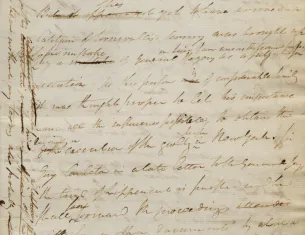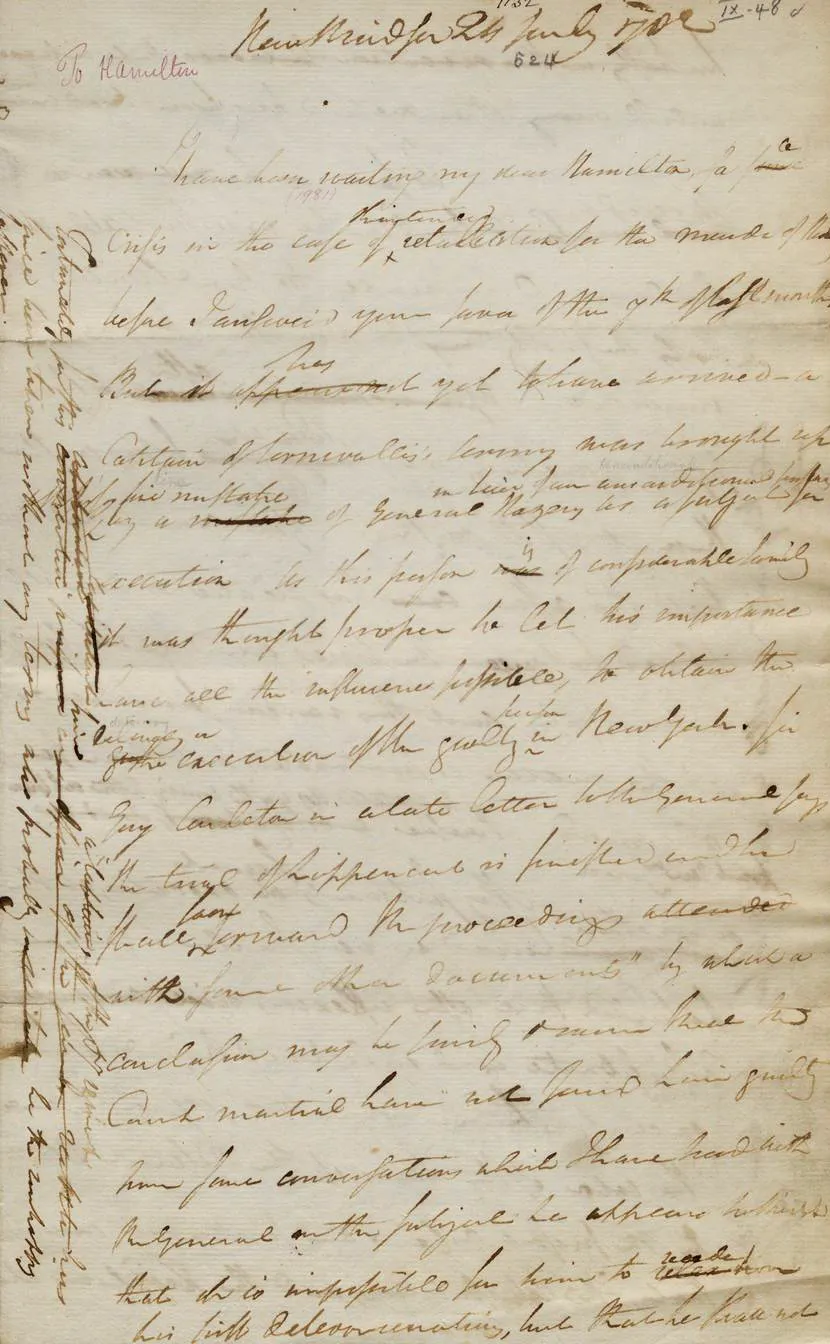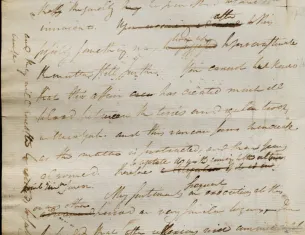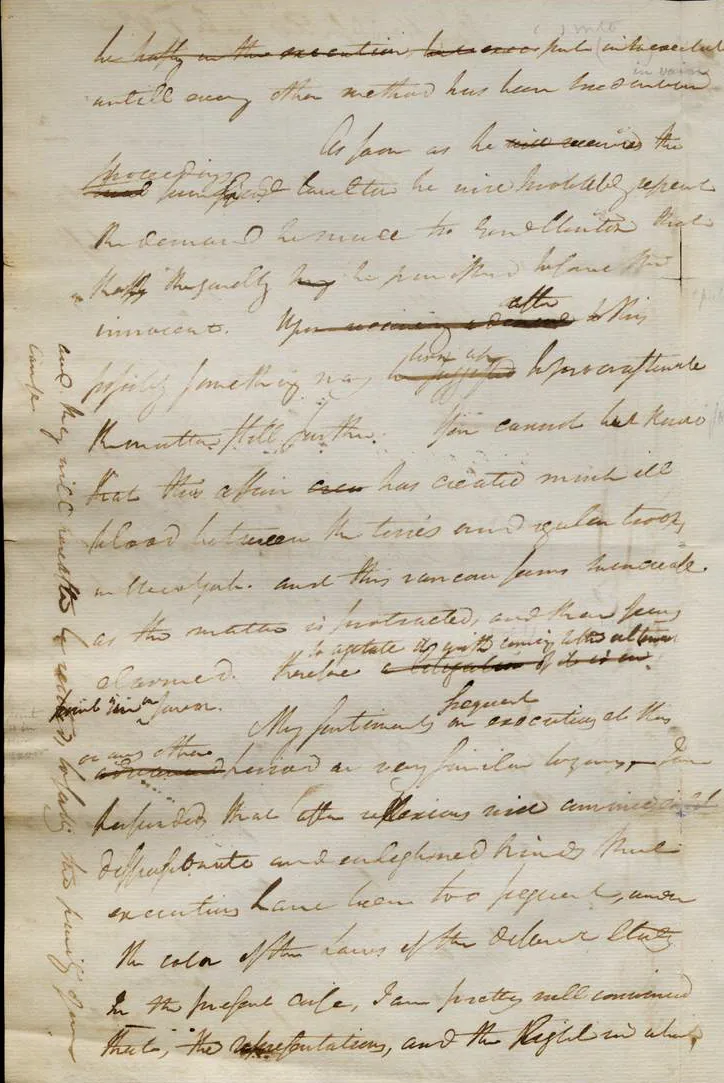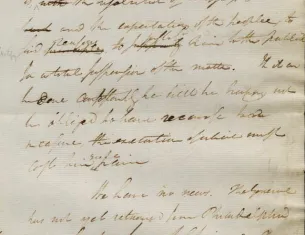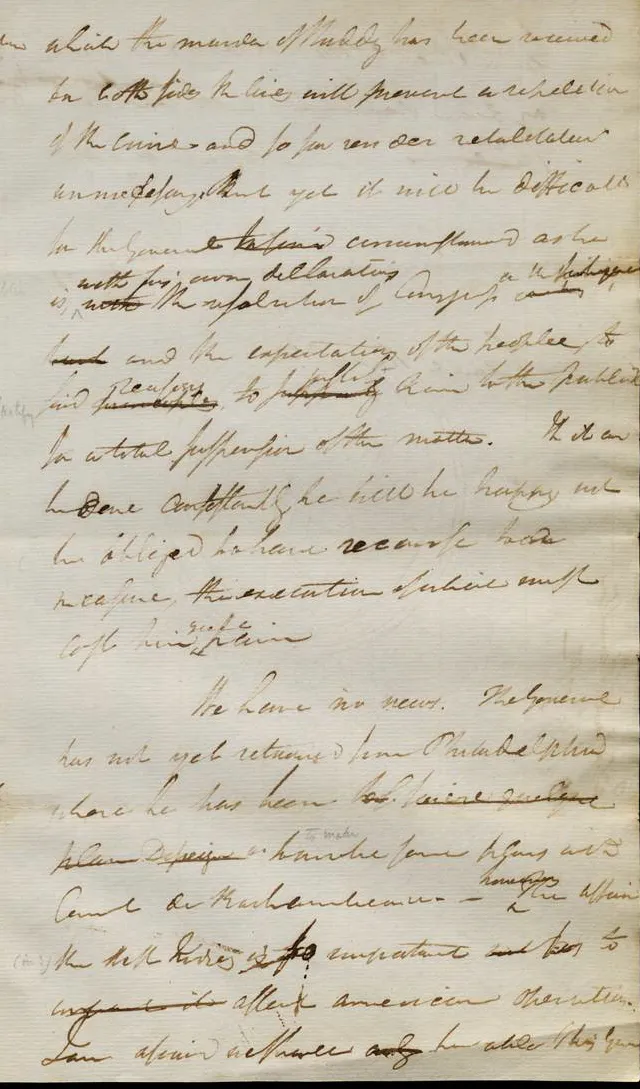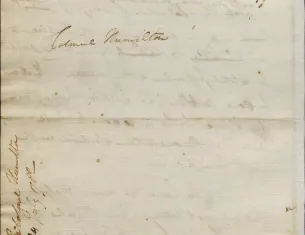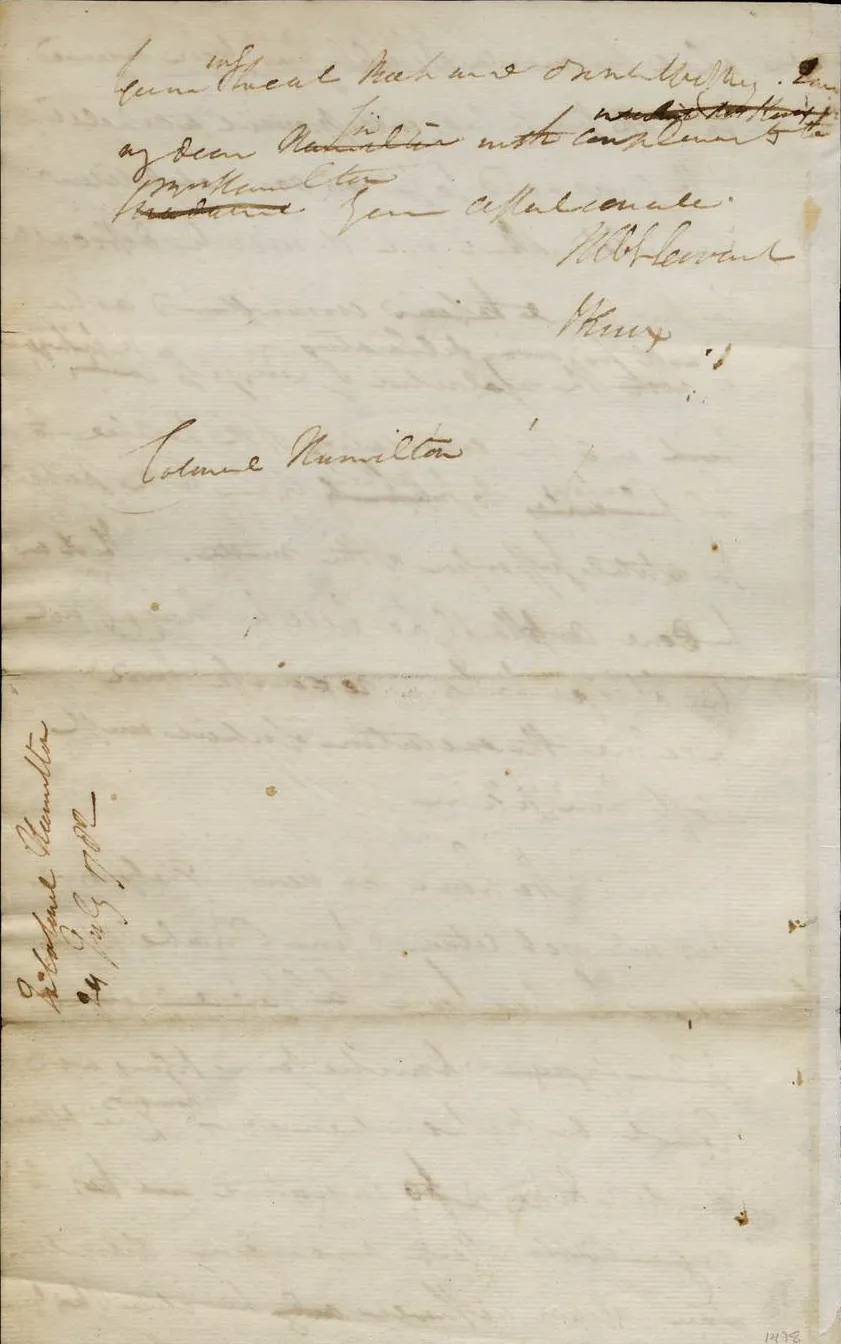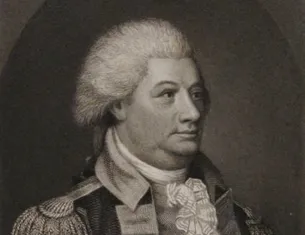Henry Knox on Washington’s Reluctance to Execute a British Soldier, 1782
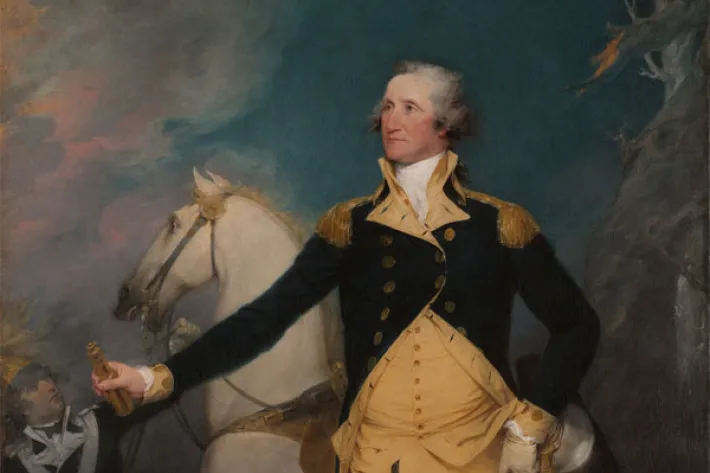
General George Washington at Trenton, by John Trumbull, 1792 (Yale University Art Gallery)
After Alexander Hamilton left the army, Henry Knox and Hamilton corresponded about the American threat to execute a British soldier in retaliation for the loyalist execution of an American in New Jersey. General Washington was reluctant to go forward with the execution, and the politics between the British and American military forces and loyalist and patriotic groups had become complicated. In this letter written on July 24, 1782, Knox describes Washington’s hope that the matter could be resolved diplomatically with all parties satisfied.
A Letter from Henry Knox to Alexander Hamilton, July 24, 1782
New Windsor 24 July 1782
I have been waiting my dear Hamilton, for a Crisis in the case of the intended retaliation for the murder of Huddy before I answer’d your favor of the 7th of last month. But it has yet to have arrived – a Captain of Cornwallis’s Army was brought up to the Jersey line by a mistake of General Hazens in lieu of an unconditional prisoner as a subject for execution As this person is of considerable family it was thought proper to let his importance have all the influence possible, to obtain the delivery or the execution of the guilty person in New York.
[inserted in the left margin of page one] Fortunately for this him a Captain of the 57 regiment has since been taken without any terms who probably be the unhappy sufferer
Sir Guy Carleton in a late letter to the General says “the trial of Lippincot is finished and he shall soon forward the proceedings with some other documents” by which a conclusion may be fairly drawn that the Court martial have not found him guilty from some conversations which I have had with the General on the subject he appears to think that it is impossible for him to recede from his first determinations, but that he shall not put into execution untill every other method has been tried in vain
As soon as he receives the proceedings from Genl Carlton he will probably repeat the demand he made to Genl Clinton that the the guilty be punished before the innocent. After to this possibly something may turn up to procrastinate the matter still further. You cannot but know that this affair has created much ill blood between the tories and regular troops in New York and this rancour seems to increase as the matter is protracted, and their fears alarmed. Therefore to agitate it with coming to the ultimate point is in our favor.
My sentiments on frequent executions at this or any other period are very similar to yours – I am persuaded that after reflexions will convince dispasionate and enlightened minds that executions have been too frequent, under the color of the Laws of the different states and they will hereafter be recited, to sully the purity of our cause. In the present case, I am pretty well convinced that, the representations, and the light in which the murder of Huddy has been received on both sides the lines will prevent a repetition of the crime and so far render retalitation unnecessary. But yet it will be difficult for the General circumstanced as he is with his own declarations the resolution of Congress on the subject and the expectations of the people, to find reasons to justify him to the publick for a total suspension of the matter. If it can be done consistently he will be happy, not be obliged to have recourse to a measure, the execution of which must cost him grate pain
We have no news. The General has not yet returned from Philadelphia here he has been to make some plans with Comte de Rochambeau –however The affair the West Indies is so important to affect American operations. I am afraid we shall only be able this year beginning to eat Beef and drink Whiskey. I am my dear Sir with compliments to Mrs Hamilton. Your affectionate
Hble Servant
HKnox
Source: Henry Knox to Alexander Hamilton, July 24, 1782, The Gilder Lehrman Institute of American History, GLC02437.01498
A Letter from Henry Knox to Alexander Hamilton, July 24, 1782
New Windsor 24 July 1782
I have been waiting my dear Hamilton, for a Crisis in the case of the intended retaliation for the murder of Huddy before I answer’d your favor of the 7th of last month. But it has yet to have arrived – a Captain of Cornwallis’s Army was brought up to the Jersey line by a mistake of General Hazens in lieu of an unconditional prisoner as a subject for execution As this person is of considerable family it was thought proper to let his importance have all the influence possible, to obtain the delivery or the execution of the guilty person in New York . . .
[inserted in the left margin of page one] Fortunately for him a Captain of the 57 regiment has since been taken without any terms who probably be the unhappy sufferer
You cannot but know that this affair has created much ill blood between the tories and regular troops in New York and this rancour seems to increase as the matter is protracted, and their fears alarmed. Therefore to agitate it with coming to the ultimate point is in our favor.
My sentiments on frequent executions at this or any other period are very similar to yours – I am persuaded that after reflexions will convince dispasionate and enlightened minds that executions have been too frequent . . . In the present case, I am pretty well convinced that, the representations, and the light in which the murder of Huddy has been received on both sides the lines will prevent a repetition of the crime and so far render retalitation unnecessary. But yet it will be difficult for the General circumstanced as he is with his own declarations the resolution of Congress on the subject and the expectations of the people, to find reasons to justify him to the publick for a total suspension of the matter. If it can be done consistently he will be happy . . . the execution of which must cost him grate pain . . . I am my dear Sir with compliments to Mrs Hamilton. Your affectionate
HbleServant
HKnox
Source: Henry Knox to Alexander Hamilton, July 24, 1782, The Gilder Lehrman Institute of American History, GLC02437.01498
Background
After Alexander Hamilton left the army, Henry Knox and Hamilton corresponded about the American threat to execute a British soldier in retaliation for the loyalist execution of an American in New Jersey. General Washington was reluctant to go forward with the execution, and the politics between the British and American military forces and loyalist and patriotic groups had become complicated. In this letter written on July 24, 1782, Knox describes Washington’s hope that the matter could be resolved diplomatically with all parties satisfied.
Transcript
A Letter from Henry Knox to Alexander Hamilton, July 24, 1782
New Windsor 24 July 1782
I have been waiting my dear Hamilton, for a Crisis in the case of the intended retaliation for the murder of Huddy before I answer’d your favor of the 7th of last month. But it has yet to have arrived – a Captain of Cornwallis’s Army was brought up to the Jersey line by a mistake of General Hazens in lieu of an unconditional prisoner as a subject for execution As this person is of considerable family it was thought proper to let his importance have all the influence possible, to obtain the delivery or the execution of the guilty person in New York.
[inserted in the left margin of page one] Fortunately for this him a Captain of the 57 regiment has since been taken without any terms who probably be the unhappy sufferer
Sir Guy Carleton in a late letter to the General says “the trial of Lippincot is finished and he shall soon forward the proceedings with some other documents” by which a conclusion may be fairly drawn that the Court martial have not found him guilty from some conversations which I have had with the General on the subject he appears to think that it is impossible for him to recede from his first determinations, but that he shall not put into execution untill every other method has been tried in vain
As soon as he receives the proceedings from Genl Carlton he will probably repeat the demand he made to Genl Clinton that the the guilty be punished before the innocent. After to this possibly something may turn up to procrastinate the matter still further. You cannot but know that this affair has created much ill blood between the tories and regular troops in New York and this rancour seems to increase as the matter is protracted, and their fears alarmed. Therefore to agitate it with coming to the ultimate point is in our favor.
My sentiments on frequent executions at this or any other period are very similar to yours – I am persuaded that after reflexions will convince dispasionate and enlightened minds that executions have been too frequent, under the color of the Laws of the different states and they will hereafter be recited, to sully the purity of our cause. In the present case, I am pretty well convinced that, the representations, and the light in which the murder of Huddy has been received on both sides the lines will prevent a repetition of the crime and so far render retalitation unnecessary. But yet it will be difficult for the General circumstanced as he is with his own declarations the resolution of Congress on the subject and the expectations of the people, to find reasons to justify him to the publick for a total suspension of the matter. If it can be done consistently he will be happy, not be obliged to have recourse to a measure, the execution of which must cost him grate pain
We have no news. The General has not yet returned from Philadelphia here he has been to make some plans with Comte de Rochambeau –however The affair the West Indies is so important to affect American operations. I am afraid we shall only be able this year beginning to eat Beef and drink Whiskey. I am my dear Sir with compliments to Mrs Hamilton. Your affectionate
Hble Servant
HKnox
Source: Henry Knox to Alexander Hamilton, July 24, 1782, The Gilder Lehrman Institute of American History, GLC02437.01498
Excerpt
A Letter from Henry Knox to Alexander Hamilton, July 24, 1782
New Windsor 24 July 1782
I have been waiting my dear Hamilton, for a Crisis in the case of the intended retaliation for the murder of Huddy before I answer’d your favor of the 7th of last month. But it has yet to have arrived – a Captain of Cornwallis’s Army was brought up to the Jersey line by a mistake of General Hazens in lieu of an unconditional prisoner as a subject for execution As this person is of considerable family it was thought proper to let his importance have all the influence possible, to obtain the delivery or the execution of the guilty person in New York . . .
[inserted in the left margin of page one] Fortunately for him a Captain of the 57 regiment has since been taken without any terms who probably be the unhappy sufferer
You cannot but know that this affair has created much ill blood between the tories and regular troops in New York and this rancour seems to increase as the matter is protracted, and their fears alarmed. Therefore to agitate it with coming to the ultimate point is in our favor.
My sentiments on frequent executions at this or any other period are very similar to yours – I am persuaded that after reflexions will convince dispasionate and enlightened minds that executions have been too frequent . . . In the present case, I am pretty well convinced that, the representations, and the light in which the murder of Huddy has been received on both sides the lines will prevent a repetition of the crime and so far render retalitation unnecessary. But yet it will be difficult for the General circumstanced as he is with his own declarations the resolution of Congress on the subject and the expectations of the people, to find reasons to justify him to the publick for a total suspension of the matter. If it can be done consistently he will be happy . . . the execution of which must cost him grate pain . . . I am my dear Sir with compliments to Mrs Hamilton. Your affectionate
HbleServant
HKnox
Source: Henry Knox to Alexander Hamilton, July 24, 1782, The Gilder Lehrman Institute of American History, GLC02437.01498
